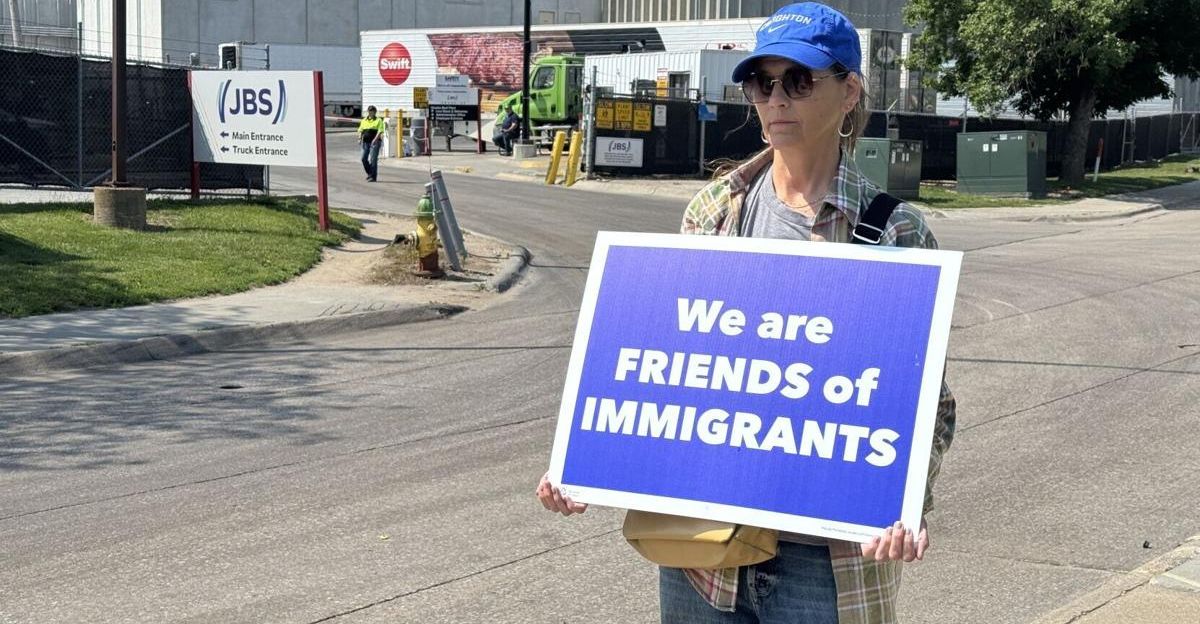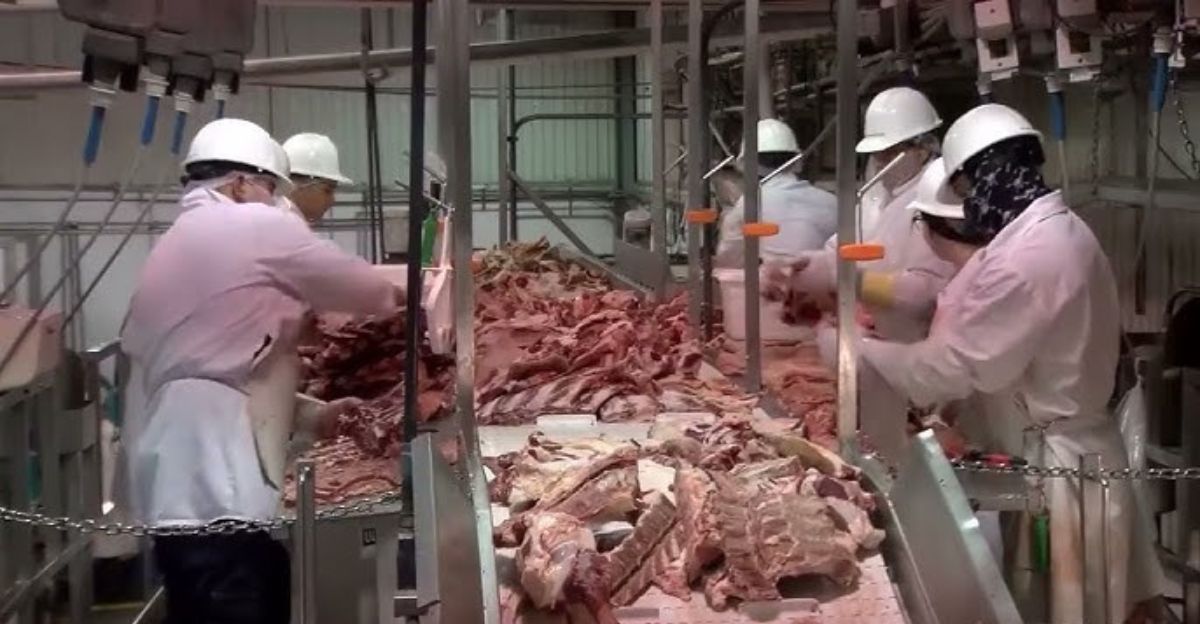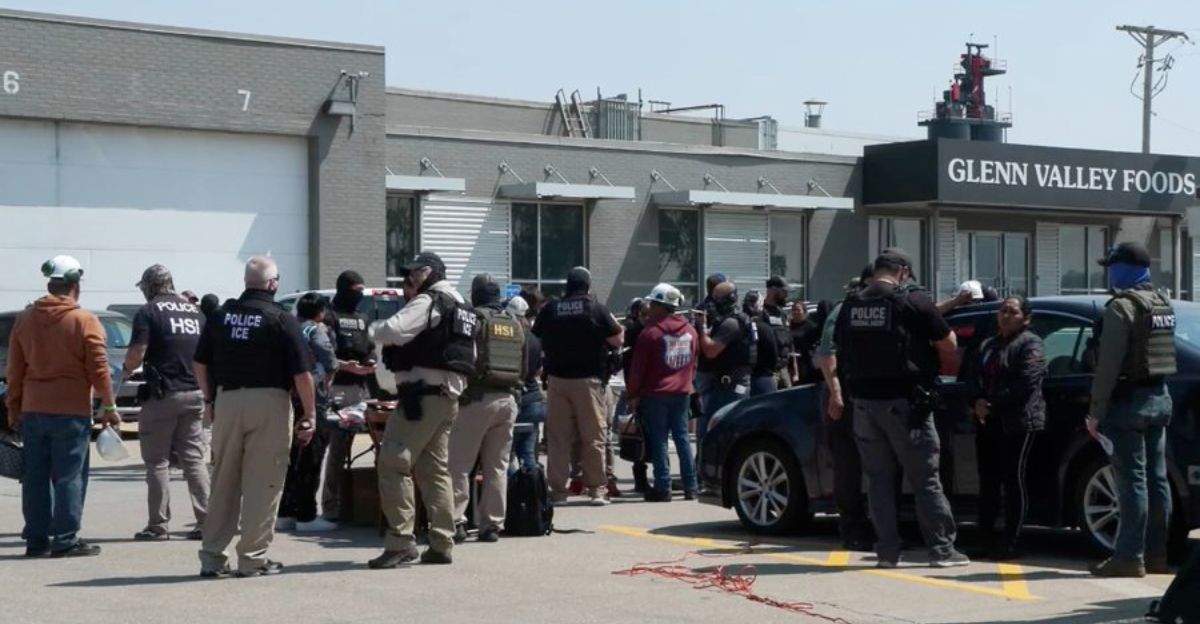
With one sweep, an ICE raid at Omaha’s Glenn Valley Foods meatpacking factory took 57% of its workforce in one day, a staggering figure that echoed far beyond the factory floor.
While immigration enforcement is a familiarly politicized fighting ground, the scale and impact of this operation highlight a more profound, though little understood, truth: the tenuous dependence of leading industries on immigrant workers.
The raid suspended production and uncovered systemic contradictions, companies reliant on a broken verification system, workers living in fear, and the food chain teetering. This episode forces us to consider the complex human and economic costs of immigration policy enforcement.
Industry Dependence On Foreign Labor

Meatpacking plants such as Glenn Valley Foods have traditionally relied on immigrant laborers to perform the arduous, low-paying work. To continue its operations, the facility used E-. Verify which is a federal program that verifies legal work status.
Even after using E-Verify, the facility lost more than half its employees on one night. This irony points to a dysfunctional immigration system in which employers follow regulations but still experience mass workforce depletion.
The raid shows how companies struggle to balance legal compliance with staying operationally alive. It lays bare a labor pattern vulnerable to sudden shocks that erode food production and economic stability.
The Broken E-Verify System

The company president’s meeting with ICE agents, who openly claimed “the system is broken,” captures a fundamental failure in immigration enforcement systems. E-Verify aims to prevent illegal employment.
However, the flaws give employers an untenable position of being forced to operate an imperfect system and facing heavy sanctions for the imperfections. This inspection demonstrates how government incompetence can create crises for the private sector.
It raises issues of accountability and fairness to punish companies for flaws in a system over which they have no control.
How Plant Closures Reverberate In The Supply Chain

Jailing 74 to 76 workers out of 140 chopped Glenn Valley Foods’ output to a minimum of 20% of normal. The drop has imperiled supply chains and lifted beef prices even further in tight markets because of the drought and smaller cow inventories.
At the same time, the raid worsens an already existing shortage of meat processing workers, which chills enforcement of food security and inflation issues. The event has demonstrated that immigration enforcement has inadvertently stressed vital economic industries and shocked customers nationwide.
Psychological Effects On Staff and Societies

In addition to public economics, the raid yielded a source of trauma and fear, and for the most part, workers refused to work; immigrant communities were left to process the loss of colleagues and the lingering threat of deportation, resulting in high levels of shock and fear.
The psychological burden has severe implications for families and local economies that were dependent on undocumented workers in their communities. The human cost of the raid is causing decision-makers to think about the social costs of hard-line enforcement beyond just numbers.
Understanding Enforcement As A Signal Of Political Policy

This raid fits into the pattern of strategic intensification under the Trump administration’s directive to increase deportations to record levels. It is the theatre of the administration’s priorities through direct action by carrying out attention-grabbing workplace raids that symbolize that they mean business.
However, theatre also has the potential to alienate immigrant communities and destabilize areas of the economy. The political calculus of enforcement programs like this one often overlooks these nuanced realities, exacerbating polarization and social strife.
Can Public Outrage/Protest Be Catalysts For Action?

The raid sparked rapid backlash in several announcements, some of which were planned demonstrations in which demonstrators faced ICE agents head-on, while other, more impromptu announcements were made by incensed citizens who were disgusted by the way the raids were carried out.
This type of incident will initiate more organized opposition to the undeniably arbitrary or disproportionate practices of immigration enforcement. Protests like this can also lead to actions that can affect community perceptions, galvanize social movements, and even compel state and local policymakers to modify their approaches to enforcement and targeting.
Lessons From History On Enforcement Sweeps

Mass immigration enforcement operations have a historical pattern of disrupting industries that rely on unauthorized labor employees, especially in areas such as agriculture and manufacturing.
Many enforcement activities show that depriving labor markets of a workforce leads to significant disruptions, shortages occur, production drops, and inefficiencies increase in the economy.
This raid is part of a broader scheme that sees enforcement as independent of the financial realities of paying for enforcement actions. It underscores the urgent need to reconsider the enforcement regime of the Broken System, as law enforcement ultimately meets the labor needs of markets from a security perspective.
Rethinking The “Broken System”

The Omaha raid represents a “broken system ” model in which policy, enforcement mechanisms, and labor market needs are out of sync. Employers rely on inadequate verification systems, and Workers face legal vulnerabilities.
Further, enforcement agencies are politically driven and narrowly focused, so connectedness is lost. This results in cascading failures like labor depletion, economic destabilization, and social disturbance, necessitating integrated policy solutions grounded in root causes.
Planning For Sustainability In Immigration and Labor

The ICE raids at Glenn Valley Foods illustrate the friction between immigration enforcement and the farm food economy that relies on foreign labor. The raided organization also had structural concerns: weak just-in-time supply chains; inaccurate compliance verification processes; and ramifications for employers and overall community welfare.
Facing immigration violations requires a measured posture to solve problems. Considering immigration as a policy space enables us to develop regular, legal pathways for immigrant employees to enter the United States, propose more rigorous verification technology with mitigation measures, and implement enforcement measures based on economic demand.
Discover more trending stories and Follow us to keep inspiration flowing to your feed!

Craving more home and lifestyle inspiration? Hit Follow to keep the creativity flowing, and let us know your thoughts in the comments below!
